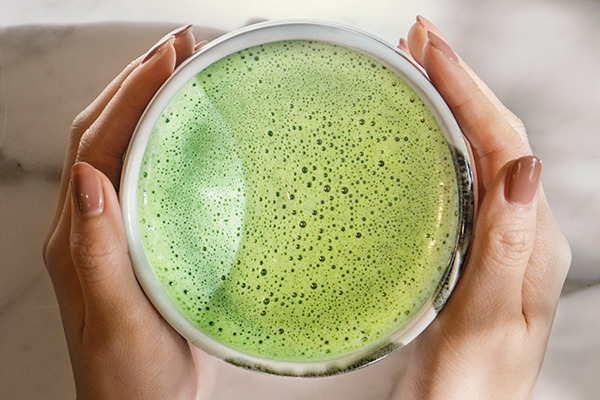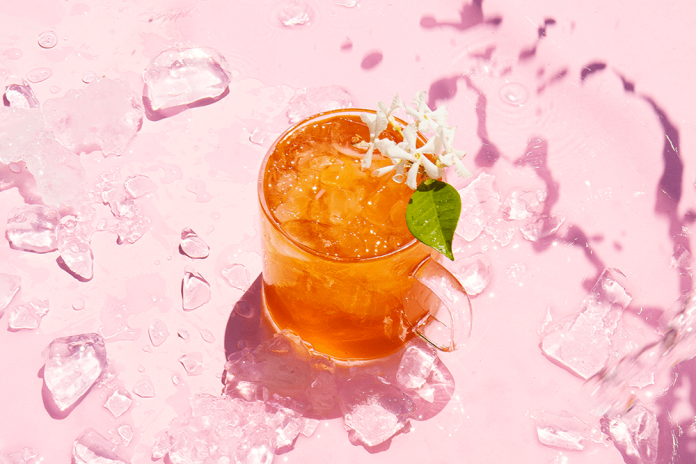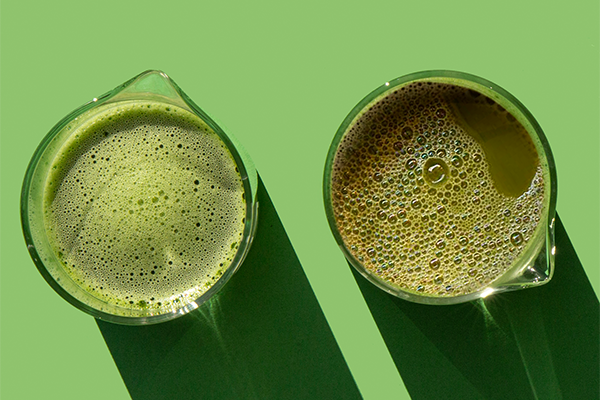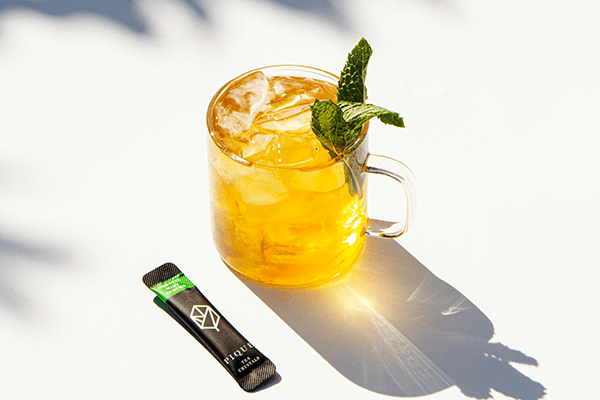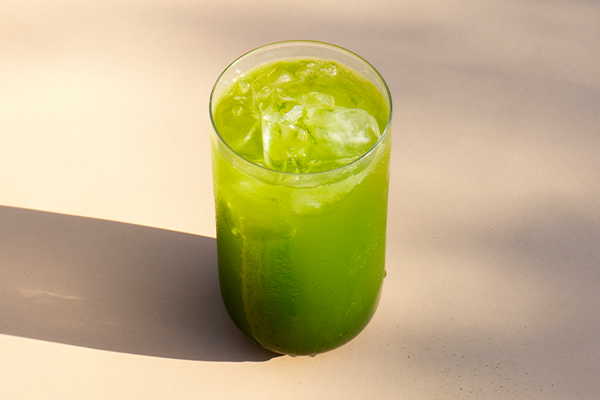So you want to add the impressive health benefits of green tea to your life, but maybe you’re not sure about the caffeine content? We wanted to shed some light on the topic for you.
Whether you’re wary about the caffeine content being too high, or skeptical that it can give you the caffeine kick you need in the morning, this little primer should give you the info you need.
Does Green Tea Have Caffeine?
Despite a popular fallacy that green teas are caffeine-free, green tea does contain caffeine! Although it’s on the relatively low end of the spectrum. Caffeine is a naturally occurring substance in the tea leaves of the Camellia Sinensis plant, from which all green and black teas are made.
How Much Caffeine Is In Green Tea?
On average, an 8-ounce cup of green tea contains about 35 mg of caffeine.
Now, the actual amount of caffeine you’re getting from your mug of green tea will depend on the type of green tea, where the leaves were grown, how they were harvested and processed, and how the tea was brewed.
Green tea’s caffeine quantity, then, could range from 12 to 75 mg per 8 ounce cup, with matcha green teas sometimes exceeding that range (more on that in a bit).
How Much Caffeine Is Too Much?
Did you know that caffeine is the world’s most popular psychoactive drug? It’s true! (1)
Most of us don’t think of caffeine as a drug, but it functions just like one. In other words, it has addictive properties and potential side effects, which is something you might want to keep in mind if you’re trying to figure out what amount is right for you. (2)
But not to fear, the FDA has deemed moderate caffeine consumption to be perfectly safe, and also effective at helping to manage headaches and supporting mental alertness. The generally recommended range of daily caffeine intake is between 130-300 mg.
If you’re getting more than 400 mg a day, you might want to consider reducing your intake. (3) This is especially true if you happen to suffer from headaches, jitters or anxiety. And bear in mind, for most healthy adults, consuming greater than 500 mg of caffeine in one day can lead to insomnia, fast heartbeat, muscle tremors, upset stomach, and anxiety.
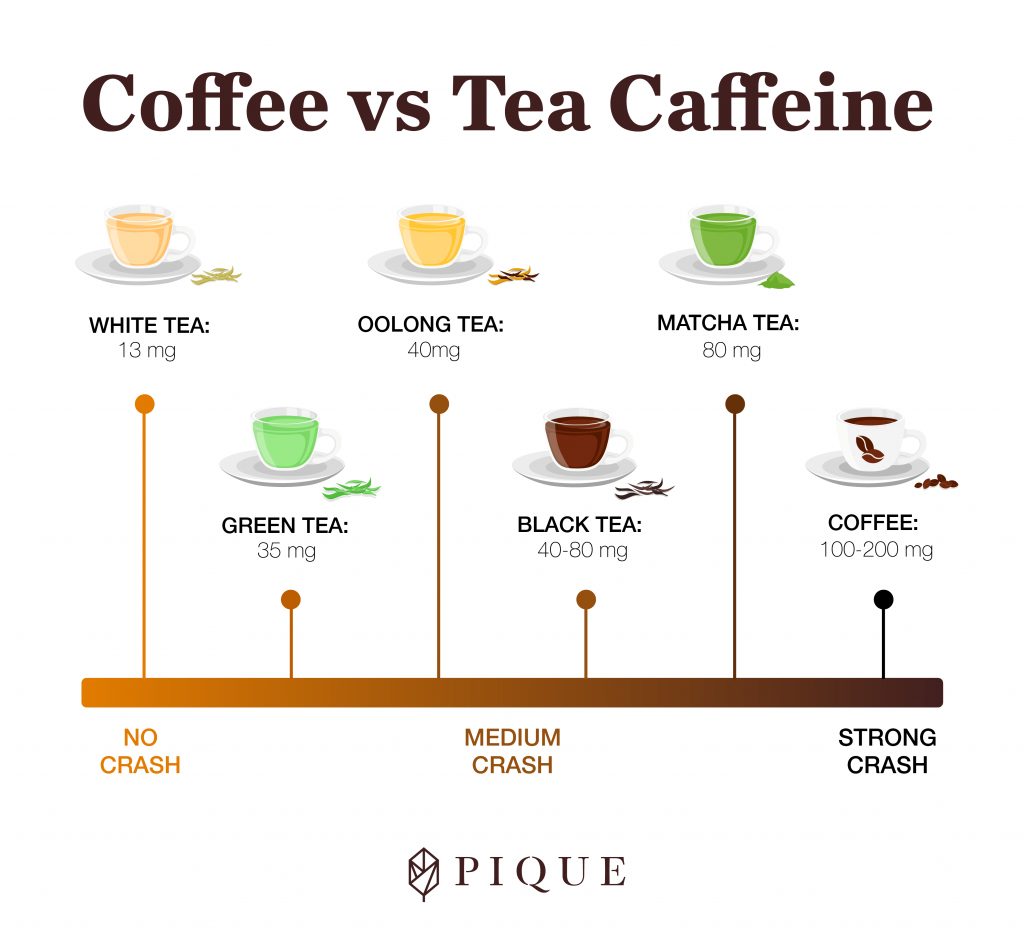
The Caffeine Contenders:
Green Tea caffeine vs. Matcha vs. Black Tea vs. Coffee
Wondering how the caffeine in green teas and black teas stacks up against coffee? Here’s the breakdown:
A cup of coffee or a shot of espresso contains on average anywhere from 100 to 200 mg of caffeine, though it depends on the type of coffee bean and how long you brew it. At around 35 mg per cup of tea, green tea has substantially less caffeine. If you’re craving more caffeine than that, you might want to consider matcha tea.
Matcha is a type of green tea that actually has more caffeine than all other green teas. This is because matcha is made by grinding the entire tea leaf into a powder, then drinking it. This process results in a higher amount of caffeine than simply brewing the leaves. A cup of matcha can have as much as 80 mg of caffeine. Here’s our recommendation for the best ceremonial grade matcha:
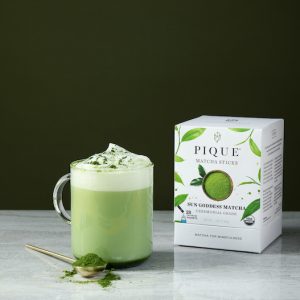
Pique Sun Goddess Matcha
The world’s purest matcha, crafted to the highest standards of the finest ceremonial grade matcha. Designed for mindfulness. A mug full of zen.
Black tea contains anywhere from 40-80mg of caffeine, depending on the quality of the leaves and how they are brewed.
Oolong tea tends to fall right between green tea and black tea in terms of caffeine content.
White tea tends to have the lowest amount of caffeine, more in the range of 10-20 milligrams of caffeine per cup of tea. As you can see, the caffeine levels can vary quite a bit based on the type of tea and the brewing time.
You can, of course, find decaffeinated versions of all of these (green tea, black tea, coffee, etc.). Any grocery store will shelf at least a few varieties of decaffeinated tea bags.
Additionally, herbal teas tend not to have any caffeine in them (though it does depend on your definition of herbal tea, as something like yerba mate or guayusa does indeed have caffeine).
All Caffeine Is Not Created Equal
Do you know of anyone who has tried to quit coffee because they’re trying to cut back on caffeine? Or maybe you find yourself being sensitive to the caffeinated effects of coffee?
Most people don’t realize that the caffeine you get from coffee acts very differently than the caffeine you get in tea. So even if you’re trying to quit coffee (or find its effects to be too strong), this does NOT necessarily mean you also need to avoid teas containing caffeine.
Here’s why: Tea caffeine is metabolized differently by your body than the caffeine in coffee, which means that it will affect you very differently.
Specifically, the caffeine in tea binds to the antioxidants in the tea, which slows the absorption of the caffeine. So instead of getting the quick jolt and subsequent crash that coffee caffeine provides, tea caffeine is released in a slow and steady supply. This is especially true of green tea caffeine, particularly due to a very interesting amino acid called L-theanine, which is present in high quantities in green tea.
L-theanine is an antagonist to caffeine, which means it helps to calm your nervous system and leads to less of the jitters or shakiness that people commonly associate with drinking lots of caffeine (i.e. coffee). This means a cup of tea and a cup of coffee, even if they had similar levels of caffeine, might make you feel differently.
Final Thoughts
As far as caffeinated drinks go, green tea is on the relatively low end of the spectrum.
If you’re wary of adding any more caffeine to your diet, you might enjoy the gentle energy boost that a cup of green tea can give you.
And if you’re a caffeine junkie, you might find that green tea’s steady, calming boost could be just what you need.
